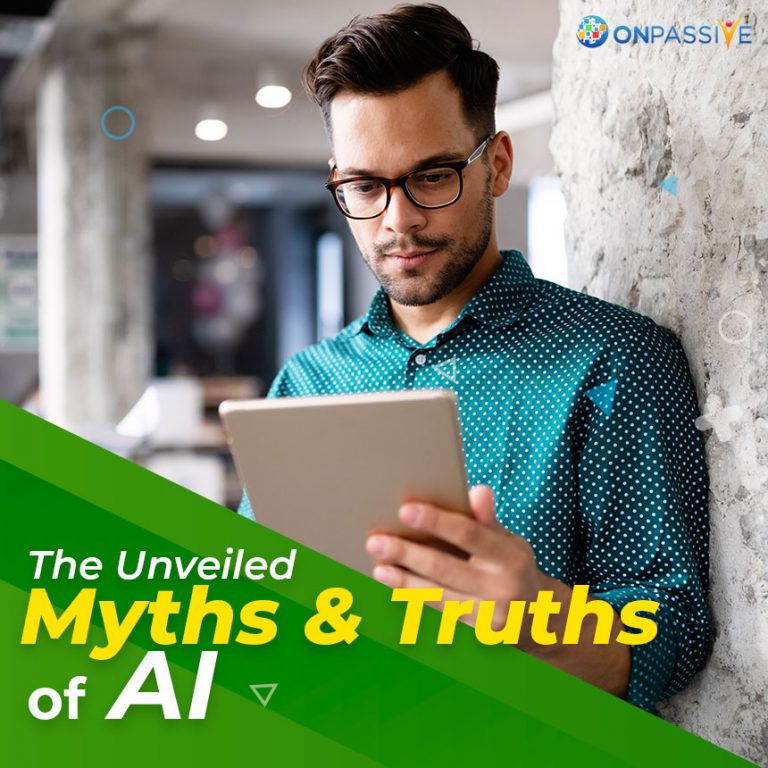
Recent breakthroughs in machine learning, speech recognition, computer vision, and big data are increasing the potential of AI in industries globally. For instance, in the IT sector, the role of AI tools is not merely about codifying business logic but also about making tasks effortless, innovative, and trouble-free. With its wide range of applications, AI is already proving itself in the market. Billions of dollars flowing into AI startups are already having an impact, turning out captivating tools that leverage cognitive technologies can give your business’ decision-making processes a considerable upgrade.
With these transformations, the myths about artificial intelligence are getting pretty dense. In this article, we’ve debunked some myths and realities of artificial intelligence to help you understand the truth about today’s AI landscape and set your business on the right path toward success in the world of AI.
5 Artificial Intelligence Myths and Realities
#1: AI technologies are not yet ready for industrial adoption
It’s a common misconception that AI technologies are not yet prepared for industrial adoption. But the truth is, AI tools are still in the early stages of adoption, so AI algorithms need more real-world experiences. Market players must understand that it would be unfair and technically wrong to judge AI solutions at these early stages.
Besides, in AI solutions, we leverage the problem description, actual data, domain knowledge, and specific goals to create, train, and verify ML algorithms. So, shifts in mindset coupled with multi-agent distributed and interconnected cognitive systems play a significant role in deciding whether the organization’s efforts to leverage AI capabilities would succeed or not.
#2: AI can make sense of all data
This is a common misconception about AI technologies and tools. The most vital input for AI applications is the correct data. Data is relevant to the problem being solved and specific to a set of use cases and knowledge domains.
It’s high time for you to comprehend that AI can’t provide intellect data that is not digestible by the system. Rather than ingesting anything and everything, an AI system needs information and content that has been carefully curated and is of high quality.
#3: AI technologies can solve new problems the way the human brain can
Although leading IT firms state that AI can solve new problems the way the human brain can, the fact is that AI tools can’t solve problems, as they weren’t designed to solve. AI can only address the issues that typically require human interpretation and judgment, which standard programming approaches cannot solve. These include the use of ambiguous language, image recognition, and execution of complex tasks where precise conditions and outcomes cannot be predicted. Users need to define the scenarios and use cases under which it will operate. Under those scenarios, AI offers significant value, but it cannot set new scenarios in which it can operate successfully.
#4: AI tools are challenging to implement
It’s easier to apply AI tools and applications in your organization. While building an artificial intelligence solution is complicated, implementing existing tools is becoming easier every day. Tools such as an email client or productivity tools like your digital assistant or spread-sheets are not simple technologies, but you’re still able to implement them efficiently. The same is with AI in industries.
#5: AI will displace human in the near future
AI helps marketers and business leaders perform day-to-day activities with minimal resources. But it does not entirely denote that AI will replace humans in the years to come. AI needs to be considered as augmentation rather than complete automation and replacement. AI is similar to other technological advancements as it helps humans become more productive and processes more efficient.
As AI projected to transform every facet of the business, from recruiting new talents to automating accounting to day-to-day activities, some human jobs expected to replace. But the need for social interaction at the decision-making process will persist.
Wrapping Up
There’s no doubt that AI can be a game-changer that will take your business to the next level over the coming years owing to its massive set of applications across different sectors. So, it’s high time for you to start your business automation journey and take your first steps with AI. While it’s evident that starting your business automation journey with AI means overcoming some hurdles, you need to overcome those roadblocks to gain a competitive advantage in the long run. Connect with us to learn more insights into our AI-powered tools and applications and know the benefits of leveraging AI for your organization.


